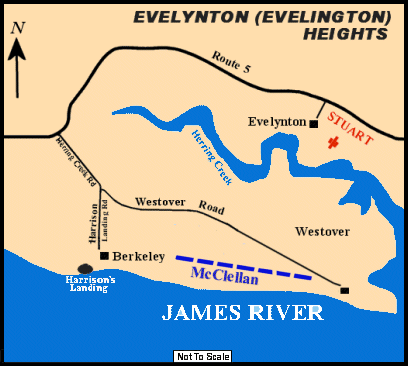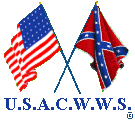 |
U. S. CIVIL WAR
PHOTOGRAPHS
|
 |
EVELYNTON (EVELINGTON)
HEIGHTS*
In the text, the icon  is a link to the definition of the word it marks. is a link to the definition of the word it marks.
Use your
browser's "back" button to return to the page.
 Cannon at Pelham's position with
Cannon at Pelham's position with
Evelynton House in the background.
| |
The end of the Seven Days.
July 2-4, 1862
After Malvern Hill, on July 2, 1862,
J.E.B. Stuart, assuming that the Federals
were somewhere near the James River, thought that some artillery fire might keep them from moving until
Stonewall Jackson's and
James Longstreet's forces came up. fire might keep them from moving until
Stonewall Jackson's and
James Longstreet's forces came up.
That night he sent Captain John Pelham, leader of
Stuart's horse artillery, to see if there might be a place from which Pelham
could sweep the Union location. Before morning, July 3, 1862, Pelham reported
that the enemy was near the Byrd mansion of Westover, on low ground dominated
by a long ridge known as Evelington Heights. Captain Pelham suggested planting
artillery on those heights.

Early on July 3, 1862 Stuart's force marched to Evelington Heights, easily
dispatching the Federal squadron on guard there. From their position, the
Confederates could see the enemy's wagon trains and camps below the heights. On
Stuart's order, Pelham began firing his small howitzer, his only serviceable gun.
The initial shot set the teamsters to running and scared some horses, but did
little else.
Pelham kept firing but by two o'clock Stuart knew the game was up. Federal
forces were forcing back his men and Pelham was rapidly running out of
ammunition.
Stuart then learned that Jackson's and Longstreet's forces were on the Charles
City road at least six miles distant. He knew the Heights could not be held
long enough for the infantry to arrive. Accordingly, he fell back
two miles and went into camp.
The next morning, July 4, 1862, when both Jackson and Longstreet were near
enough to strike, the position of the Federals on Evelington Heights was too
strong to be challenged.
Stuart's participation in the campaign of the Seven Days
had finished. of the Seven Days
had finished.
(Primary Source: "Lee's Lieutenants, A study in command" by Douglas Southall
Freeman - One-Volume Abridgment by Stephen W. Sears, Pages 271-272 hardback
version)
|
|
 |
 |
Confederate Cannon Position
on Evelynton Heights - 2000.
|
View from Evelynton Heights - 2000.
|

Sign at Evelynton - 2002
This sign, at the cannon location, appears to have the date wrong.
Freeman places the battle on July 3, 1862 (See battle description above).
* There is some confusion regarding the spelling of Evelynton. The current owners
spell it "Evelynton", but Freeman spells it "Evelington". I have elected to use
"Evelynton" on this page, with the exception that I use Freeman's spelling in the
battle description. - Ed.
 >
Civil War Photos
>
Richmond - Outlying Area
> Evelynton
>
Civil War Photos
>
Richmond - Outlying Area
> Evelynton

|
|









